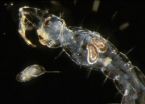(Press-News.org) DALLAS – June 23, 2011 – We are one step closer to deciphering why some stressed people indulge in chocolate, mashed potatoes, ice cream and other high-calorie, high-fat comfort foods.
UT Southwestern Medical Center-led findings, in a mouse study, suggest that ghrelin – the so-called "hunger hormone" – is involved in triggering this reaction to high stress situations.
"This helps explain certain complex eating behaviors and may be one of the mechanisms by which obesity develops in people exposed to psychosocial stress," said Dr. Jeffrey Zigman, assistant professor of internal medicine and psychiatry and senior author of a study appearing online today and in a future print edition of the Journal of Clinical Investigation. "We think these findings are not just abstract and relevant only to mice, but likely are also relevant to humans."
Scientists know that fasting causes ghrelin to be released from the gastrointestinal tract, and that the hormone then plays a role in sending hunger signals to the brain. Dr. Zigman's laboratory has previously shown that chronic stress also causes elevated ghrelin levels, and that behaviors generally associated with depression and anxiety are minimized when ghrelin levels rise. In mice, these stress-induced rises in ghrelin lead to overeating and increased body weight, suggesting a mechanism for the increased prevalence of weight-related issues observed in humans with chronic stress and depression.
For this investigation, the researchers developed a mouse model to determine which hormones and what parts of the brain may play a role in controlling more complex eating behaviors that occur upon stress, particularly those that lead to the indulgence of comfort foods.
They subjected mice to a standard laboratory technique that induces social stress by exposure to more dominant "bully" mice. Such animals have been shown to be good models for studying depression and the effects of chronic stress and depression in humans.
Wild-type mice subjected to the stress gravitated toward a chamber where they had been trained to find pleasurable, fatty food – the mouse equivalent of "comfort food." However, genetically-engineered mice, which were not able to respond to stress-induced increases in ghrelin, showed no preference toward the fatty food-paired chamber, and when exposed to the fatty food, did not eat as much as the wild-type animals.
"Our findings show that ghrelin signaling is crucial to this particular behavior and that the increase in ghrelin which occurs as a result of chronic stress is probably behind these food-reward behaviors," Dr. Zigman said.
The study also showed that these effects of ghrelin are due to direct interaction with a subset of neurons that use catecholamines as a neurotransmitter. These include dopaminergic neurons in the brain's ventral tegmental area, which is known to be associated with pleasure and reward behaviors.
The findings, he said, may make sense when considered from an evolutionary standpoint.
Our hunter-gatherer ancestors needed to be as calm as possible when it was time to venture out in search of food, or risk becoming dinner themselves, said Dr. Zigman, who pointed out that ghrelin's anti-depressant effects and its actions to help efficiently secure calorically-dense, tasty foods may have provided a survival advantage.
"Though it might have been beneficial to have these actions of ghrelin linked, now it seems to be a cause of a lot of morbidity in our modern society," Dr. Zigman said. "Ultimately, these linkages also may present a large challenge to the development of therapeutics to treat and/or prevent obesity."
The researchers next plan to investigate the molecular mechanisms by which ghrelin acts to cause these stress-associated food-reward behaviors.
###Other UT Southwestern researchers involved in the study were Dr. Jen-Chieh Chuang, co-lead author and postdoctoral researcher in internal medicine; Sherri Osborne-Lawrence, senior research scientist; Dr. Michael Lutter, assistant professor of psychiatry; Dr. Ichiro Sakata, former postdoctoral researcher in internal medicine; and Dr. Mario Perello, co-lead author and former postdoctoral researcher in internal medicine. Dr. Perello currently works at the Multidisciplinary Institute of Cell Biology in Buenos Aires, Argentina. A researcher from Johns Hopkins University School of Medicine also contributed.
The work was supported by the National Institutes of Health, the Foundation for Prader-Willi Research, the Klarman Family Foundation, the National Alliance for Research on Schizophrenia and Depression, and the Disease-Oriented Clinical Scholars Program at UT Southwestern.
Visit http://www.utsouthwestern.org/neurosciences to learn more about UT Southwestern's clinical services in neurosciences, including psychiatry.
This news release is available on our World Wide Web home page at
http://www.utsouthwestern.edu/home/news/index.html
To automatically receive news releases from UT Southwestern via email,
subscribe at http://ww.utsouthwestern.edu/receivenews
Ghrelin likely involved in why we choose 'comfort foods' when stressed
2011-06-24
ELSE PRESS RELEASES FROM THIS DATE:
Ovenbirds eavesdrop on chipmunks to protect nests
2011-06-24
Ground-nesting birds face an uphill struggle to successfully rear their young, many eggs and fledglings falling prey to predators. Now, scientists from the USA have found that some birds eavesdrop on their enemies, using this information to find safer spots to build their nests. The study – one of the first of its kind – is published this week in the British Ecological Society's Journal of Animal Ecology.
Ovenbirds and veeries both build their nests on the ground, running the risk of losing their eggs or chicks to neighbouring chipmunks. Nesting birds use a range of cues ...
Quien es responsable cuando su hijo esta manejando el automovil que usted le presto y se ve involucrado en un accidente de transito en Nueva York?
2011-06-24
Es una historia de la que ningun padre quiere oir hablar, pero que, lamentablemente, todos hemos escuchado alguna vez. Supongamos que "Junior" pide prestado el coche y tiene un accidente. Puede ser que haya chocado simplemente contra un buzon o puede tratarse de algo mas serio. En el caso de accidentes que tengan como resultado lesiones, quien es responsable? "Junior", que solo tiene 16 anos? Sus padres? El propietario registrado del automovil?
Generalmente, de acuerdo con la ley de Vehiculos y Transito de Nueva York, cuando una persona se ve involucrada ...
Who goes there? Novel complex senses viral infection
2011-06-24
Double-stranded (ds) RNA viruses are a diverse group of viruses that include rotaviruses, a common cause of gastroenteritis. The ability of the immune system to detect and destroy viruses is critical for human health and survival. Now, a study published by Cell Press in the June 23rd issue of the journal Immunity identifies a novel sensor that is necessary to activate the immune response to viral infection. The research enhances our understanding of the complex and overlapping mechanisms our immune cells use to thwart infection.
Viruses are infectious agents composed ...
Cautionary tale for people with diabetes: Dog consumed part of a sleeping patient's toe
2011-06-24
Van Nuys, CA – June 23, 2011 – In a case study that illustrates the need for people with diabetes to be cautious of foot injuries and to protect themselves from pets, a woman with numbness in her feet caused by diabetic neuropathy slept through a traumatic episode in which her Jack Russell terrier chewed off part of her slightly infected big toe, according to an article published in this month's issue of the Journal of the American Podiatric Medical Association.
The patient's wound required surgery, and it ultimately led the amputation of her leg, leaving her a double ...
GSA Bulletin highlights: New research posted June 14, 2011
2011-06-24
Boulder, CO, USA - GSA BULLETIN offers pre-issue publication of papers online. Sign up for e-alerts at http://www.gsapubs.org/cgi/alerts or the Bulletin RSS feeds at http://gsabulletin.gsapubs.org/rss/, for first access to new journal content as it is posted.
Research highlights are provided below. Representatives of the media may obtain complimentary copies of GSA BULLETIN articles by contacting Christa Stratton at the address above. Please discuss articles of interest with the authors before publishing stories on their work, and please make reference to GSA BULLETIN ...
Scientists a step closer to understanding 'natural antifreeze' molecules
2011-06-24
Scientists have made an important step forward in their understanding of cryoprotectants – compounds that act as natural 'antifreeze' to protect drugs, food and tissues stored at sub-zero temperatures.
Researchers from the Universities of Leeds and Illinois, and Columbia University in New York, studied a particular type of cryoprotectants known as osmolytes. They found that small osmolyte molecules are better at protecting proteins than larger ones.
The findings, published in Proceedings of the National Academy of Sciences, could help scientists develop better storage ...
Finding is a feather in the cap for researchers studying birds' big, powerful eyes
2011-06-24
BETHESDA, Md., June 23, 2011 – Say what you will about bird brains, but our feathered friends sure have us -- and all the other animals on the planet -- beat in the vision department, and that has a bit to do with how their brains develop.
Consider the in-flight feats of birds of prey: They must spot their dinner from long distances and dive-bomb those moving targets at lightning speed. And then there are the owls, which operate nimbly on even the darkest nights to secure supper in swift swoops. Some birds have ultraviolet sensitivity; others have infrared sensitivity. ...
Northern Rock Adds Helpful Savings Video Guide to its Website
2011-06-24
Northern Rock has added another helpful video guide to its interactive savings website to help consumers with their savings choices.
The video - Northern Rock's Guide to Savings - is the third guide in the series recently introduced by the bank to add a further dimension to its award-winning website. Existing videos include Northern Rock's Guide to ISAs and First Time Buyers Guide, which can be viewed on the Northern Rock website alongside the new addition.
The newest guide is designed to help customers make the most of their money in an accessible way, by highlighting ...
High technology, not low taxes, may drive states' economic growth
2011-06-24
High-tech training may trump tax breaks for creating more jobs and improving a state's economy, according to a team of economists.
"We found that lower state taxes were not statistically associated with a state's economic performance," said Stephan Goetz, professor of agricultural economics and regional economics, Penn State. "The tax climate was not linked to either growth or income distribution."
Goetz, who serves as director of the Northeast Regional Center for Rural Development, said states that favor low taxes do not necessarily spend funds efficiently. They may ...
Scientists uncover an unhealthy herds hypothesis
2011-06-24
Biologists worldwide subscribe to the healthy herds hypothesis, the idea that predators can keep packs of prey healthy by removing the weak and the sick. This reduces the chance disease will wipe out the whole herd, but could it be that predators can also make prey populations more susceptible to other predators or even parasites? Biologists at the Georgia Institute of Technology have discovered at least one animal whose defenses against a predator make it a good target for one opportunistic parasite. The research appears online in the journal Functional Ecology.
"We ...


